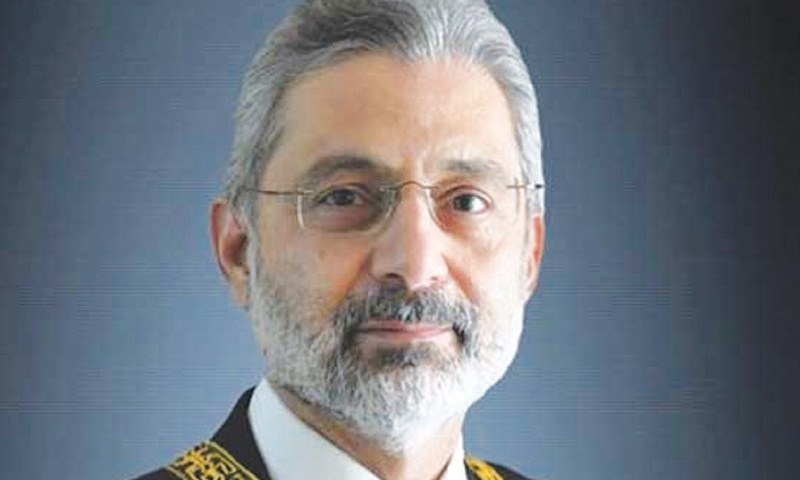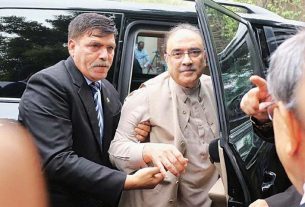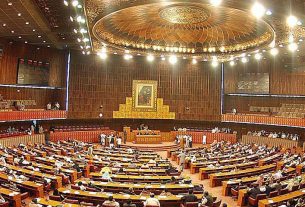ISLAMABAD: The Supreme Court on Wednesday wondered what could be the consequences if it concluded that top government functionaries — the president, the prime minister and the law minister —exceeded their discretion by filing a reference against a sitting judge of the apex court.
“If we agree with your arguments and come to the conclusion that the president, the prime minister and the law minister exceeded their discretion, then what steps or mechanism you envisage to be taken in future against them or should it be left as it is,” Justice Yahya Afridi asked advocate Muneer Malik, who is representing Justice Qazi Faez Isa in a case against the filing of the presidential reference against the judge.
Justice Afridi advised the lawyer to ponder over during the brief recess — the next hearing will be sometime next week — about consequences for top government functionaries and then apprise the court since the judiciary’s independence must be protected.
At the same time Justice Afridi also observed that acceptance of the counsel’s arguments would give blanket immunity and complete protection to judges of the Supreme Court.
“Don’t you think it is appropriate that there should be some check and balance on the judiciary too since the mother of all fundamental rights is the independence of the judiciary,” Justice Afridi said.
“No one is above the law,” the counsel replied promptly. “Credibility of the judiciary rests on its accountability.”
Muneer Malik, closing his arguments, emphasised that the reference against Justice Isa needed to be struck down since it had not been sent by the president on the cabinet’s advice.
Justice Syed Mansoor Ali Shah wondered if the president received a complaint from the executive under Article 209 of the Constitution for removing a judge, how could he form his independent opinion as the executive itself was a complainant.
Removal of the judges is a different subject altogether since it has serious consequences and needed to be guarded against the intentions of the executive, Justice Shah observed.
“I have found Article 209 unique and insulated, rather a world of its own,” the judge said. “The president, under Article 209, is not advancing or acting in furtherance of the executive functions.”
The counsel argued that appointment of superior court judges was unique as constitutional functions which have been conferred upon the president have to be exercised independently.
After the 2016 Supreme Court judgement in the Mustafa Impex case, the distinction regarding the prime minister acting solely or the cabinet’s advice has become clear.
Muneer Malik referred to a chart he had prepared to explain the evolution of Article 48 of the Constitution about the president’s exercise of his duties on the prime minister’s advice or that of the cabinet, highlighting Presidential Order 14 of the Eighth Amendment and the position after the 18th Amendment.
The reference was an attempt to stress that after the 18th Amendment, the President acts on the advice of the prime minister or the cabinet provided that after 15 days he can send it back to the prime minister or the cabinet for reconsideration of a decision but in case the same decision was approved again, the president had to act within 10 days of its resending.
The counsel also cited a number of constitutional provisions like Articles 58(1), 92(1), 98(2, 3) 93(1), 101(1), 242(1A), etc, to establish that the Constitution clearly mentions the situation where the president has to act on the advice of the prime minister.
“My case is that Article 48(1) does not give the prime minister or the cabinet carte blanche [complete freedom] to decide who will act in a particular situation and who will render advice.”
However, Justice Muneeb Akhtar observed that these articles relate to a tussle between the president and the prime minister and nothing more. These are not attempts to establish some consistency in matters of the appointment of certain officials. Rather they are ad hoc changes to restore the parliamentary form of government, Justice Akhtar added.
The counsel tried to explain that the 1973 Constitution in its pristine form provided for a parliamentary form of government by putting the prime minister in a unique position, but PO 14 of 1985 and the Eighth Amendment tilted the balance from a powerful prime minister to the president.
But Justice Akhtar observed that the counsel should not refer to the president as “he”. Instead, he should say “Gen Ziaul Haq” since these attempts by Zia were meant to perpetuate himself in power.
The counsel argued that the 18th Amendment had given a new recognition to parliamentary democracy by keeping it closer to the British parliamentary system.
When the court meets again on a date to be decided by the Supreme Court on Friday, advocate Babar Sattar will try to explain tax laws, especially the implications of Section 116 of the Income Tax Ordinance.
At the fag end of Wednesday’s hearing, Justice Umar Ata Bandial asked the counsel to elucidate on the most attractive points he made earlier about the surveillance of judges and collection of material against a judge without authorisation.



